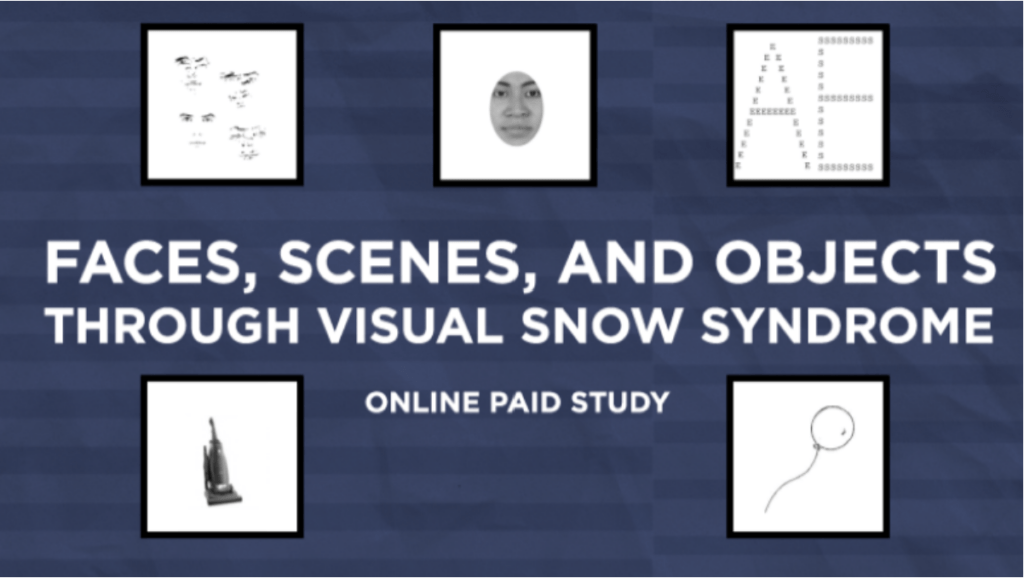Updated: The opportunity to participate in the study, “Changes in Visual Perception Associated with Visual Snow Syndrome”, has now closed.
Thank you to everyone who took initiative to participate in VSS research! Your generous support helps advance our understanding of Visual Snow Syndrome.
Dr. Peter Gerhardstein (Department of Psychology, Binghamton University) and Sam Maione (Department of Brain and Psychological Sciences, Johns Hopkins University) received a high volume of messages from volunteers and are enthused by the incredible turnout. They have just informed us they are no longer accepting volunteers via email, as they have reached the max capacity. Dr. Gerhardstein and Sam express their thanks to the Visual Snow Initiative and everyone who contacted them!
The findings will be published to increase the level of understanding of VSS in literature. The data will also be used to develop a grant proposal to the National Eye Institute or other granting agencies.
If you were unable participate in this study, rest assured there will be future opportunities. We will continue to inform you of study opportunities that become available via our website, newsletter, and/or social media.
You can also visit clinicaltrials.gov or ichgcp.net for more info on active VSS studies.
Thank you for your support! Together, we can make the world a more understanding, educated, inclusive, accessible, and accommodating place for people affected by VSS worldwide.
Are you interested in advancing scientific research and helping those affected by Visual Snow Syndrome (VSS)?
To participate, please email: baby@binghamton.edu, and a link will be provided to you.
People with VSS will now have the opportunity to participate in a new study on “Changes in Visual Perception Associated with Visual Snow Syndrome” led by Dr. Peter Gerhardstein (Department of Psychology, Binghamton University) and Sam Maione (Department of Brain and Psychological Sciences, Johns Hopkins University).
Why Volunteer?
By volunteering, you can play a crucial role in advancing VSS research and expanding universal knowledge of VSS.
The study aims to explore how VSS affects various aspects of visual perception, from basic processes to more complex functions, including contour detection, motion, as well as object and scene perception.
Researchers are interested in determining if there is a general perceptual deficit or if VSS causes more focal deficits in certain visual perceptual capabilities. Although some work has explored this area, this study will gather the further data necessary to precisely characterize the effects of visual snow on various components of visual perception.
Ultimately, these findings will be published to increase the level of understanding of VSS in literature, as well as using the data to develop a grant proposal to the National Eye Institute or other granting agencies.
Information on the Study
Participation is online and uses a set of questions (including the Colorado Visual Snow Scale from Dr. Pelak’s research program) to assess visual snow presence, and then administers a set of online tasks intended to assess performance.
You will first be asked to answer basic demographic questions, along with vision-disorder related questions. One demographic question concerns illicit drug use, so you must be 18 years or older to participate.
Duration: Approx. 90 min, with 5 tasks:
These tasks include:
- Identify faces from drawn lines
- Discriminate a reappearing face from new faces
- Pick out a target letter
- Provide the name of an object when displayed through various filters
- Type the name of a line-drawn object when some lines are removed
These tasks challenge your visual perception skills under various conditions, helping to understand the nature of VSS-related deficits.
Afterwards, you will be asked to confirm your email address, which is where you will receive a code for a $10 Amazon gift card!
Disclaimer
No identifiable information will be collected, save for the provided email address, which cannot be connected to your answers to questions or results on the experimental phase. Concentration will be required, and it is best if you maintain a fixed viewing distance. More complete instructions will be provided at the time of the experiment. The entire study must be completed in one sitting. If you normally wear glasses or contacts when you use computers/laptops, please wear them for the experiment.
How to Participate
If you are interested in participating, please email baby@binghamton.edu, and a link will be provided to you. This study is administered by a research laboratory in the Dept of Psychology at Binghamton University in New York; more information will be provided in the link.
Your Impact Matters
Your participation will contribute valuable data to VSS research, advancing our understanding of how VSS impacts visual perception.
Together, we can facilitate research progress and make a positive impact. Thank you for your consideration!


